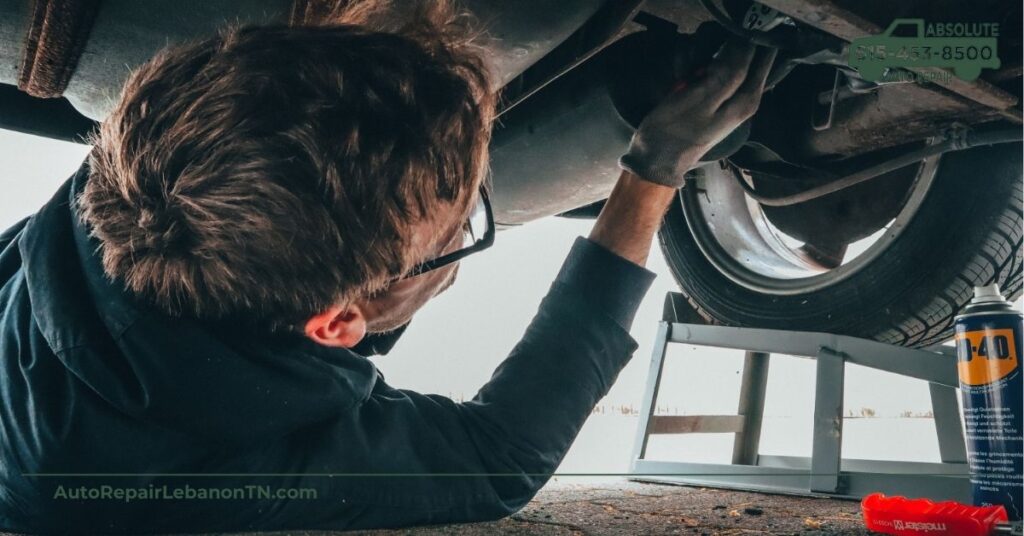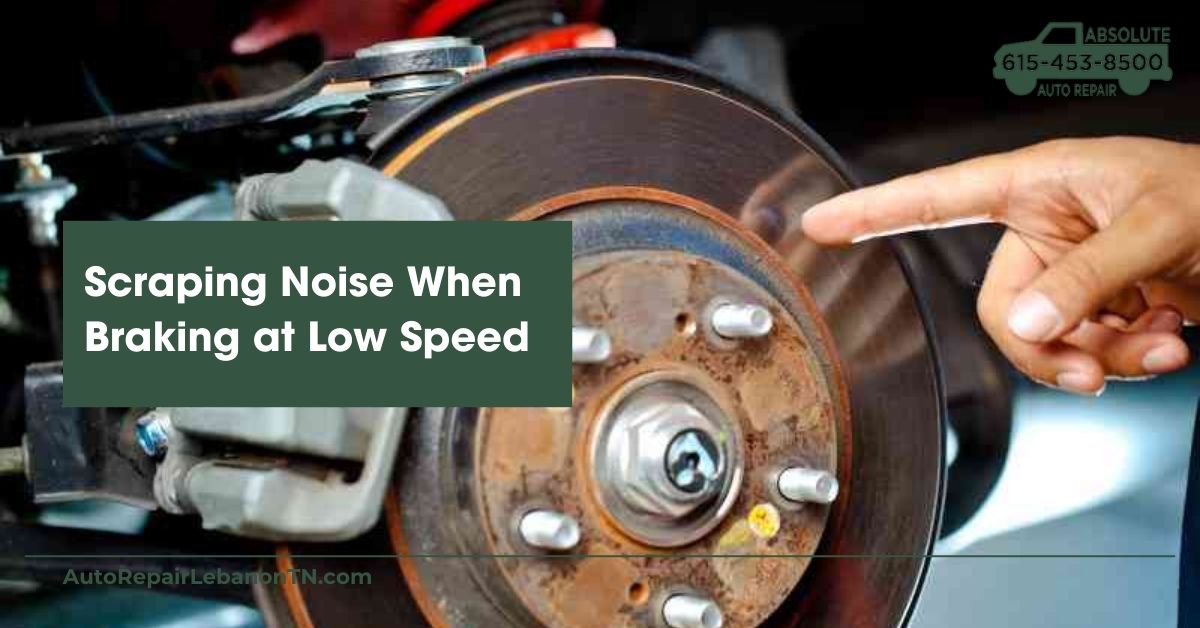If you’ve ever experienced a scraping noise when braking at low speed, you know how unsettling it can be. That sound isn’t just annoying; it could signal a deeper issue with your vehicle’s braking system. Understanding the causes behind this noise is crucial for your safety and the longevity of your car.
Ignoring those sounds might lead to more serious problems down the line. By addressing the issue early, you can save yourself from costly repairs and ensure a smoother, safer ride. Let’s jump into the common reasons behind that pesky scraping noise and what you can do to resolve it. Your peace of mind on the road is just a few insights away.
Overview of Scraping Noise When Braking at Low Speed

Scraping noise when braking at low speed can signal potential problems with your vehicle’s braking system. Identifying the root cause of this sound is crucial for your safety and the longevity of your car. Common sources of scraping noises often include worn-out brake pads, damaged rotors, or debris caught in the brake assembly.
Worn brake pads typically create a noticeable sound when they thin out, exposing metal to metal contact. Such wear can diminish braking performance, leading to safety risks on the road. Listening closely to the noises your vehicle makes can aid in early detection.
Damaged rotors also contribute to scraping noises. Warped or rusted rotors can impact braking reliability, making it essential to address any signs of wear promptly. Not addressing these issues can lead to more important repairs in the future.
Another frequent cause of scraping noises involves debris lodged in the brake assembly. Road grime or small stones can interfere with the braking mechanism, leading to unusual sounds during operation. Regular maintenance and inspections help keep these components clear.
Understanding these factors can enhance your overall driving experience. Resolving scraping noises will lead to safer driving conditions and potentially avoid costly repairs later.
Common Causes of Scraping Noise
Understanding the origins of scraping noises during low-speed braking can help you address potential issues promptly. Here are the most common culprits.
Worn Brake Pads
Worn brake pads frequently cause noticeable scraping noises. As these pads wear down, they become too thin, leading to metal-to-metal contact. Thin pads expose the metal backing, which grinds against the rotors. This not only creates unpleasant sounds but also risks damaging the rotors and diminishes your vehicle’s braking efficiency. Regular inspections can help catch this issue before it escalates.
Debris Between Pads and Rotors
Debris lodged between the brake pads and rotors can produce a scraping sound while stopping. This debris might include small rocks, dirt, or other foreign objects. When the rotor turns with the wheel, the trapped material generates unwanted noise. Addressing this issue involves simply clearing out the debris from the brake assembly, restoring the quiet operation of your brakes.
Rusty Rotors
Rusty rotors often lead to scraping noises, especially in vehicles that sit for extended periods. Moisture can cause rust to form, which disrupts smooth contact between the pads and rotors. As you brake, the rust creates a rough surface that can produce scraping sounds. For optimal performance, routine cleaning or resurfacing may be necessary to eliminate rust and restore smoothness.
Impact on Vehicle Performance

Scraping noises when braking at low speeds can significantly impact your vehicle’s performance. Understanding these effects is crucial for maintaining a safe and efficient driving experience.
Safety Concerns
Safety concerns arise when you hear scraping noises. This sound often indicates issues with the braking system, which can compromise your ability to stop effectively. Ignoring these warning signs may lead to a higher risk of accidents. Every driver should prioritize brake maintenance to ensure their safety and the safety of others on the road.
Potential Damage to Brake System
Potential damage to the brake system becomes more likely when scraping noises occur. Worn brake pads, for example, can lead to severe rotor damage due to metal-to-metal contact. Also, foreign objects lodged in the brake assembly may cause further wear on components. Loose calipers can exacerbate the situation, leading to a need for costly repairs. Addressing these issues promptly ensures your braking system remains in optimal condition and enhances overall vehicle performance.
Diagnosing the Issue

Identifying the cause of a scraping noise during low-speed braking is essential for vehicle safety and performance. You can begin diagnosing the issue through visual inspection and by testing braking performance.
Visual Inspection
Start by examining the brake pads. Worn brake pads typically exhibit visible signs of thinning. Look for any uneven wear patterns on the brake rotors, which can indicate damage or warping. Inspect the calipers for looseness or misalignment, as these issues can contribute to scraping noises. Check for foreign objects lodged between the pads and rotors, like small rocks or debris. Ensure the wheel hub and bearing are not worn or loose; misalignment can lead to contact and noise during braking.
Testing Braking Performance
Next, focus on performance testing. Listen for any scraping noises while braking at low speeds. A continuous scraping sound often signals that brake pads are too thin or that rotors are damaged. Take note of how the vehicle responds under braking pressure. If the brakes feel spongy or unresponsive, issues with calipers or air in the brake lines may be present. Feel for vibrations during braking; these can indicate warped rotors or problems with the wheel hub. Prioritize these tests to determine if immediate maintenance is necessary to ensure safe driving conditions.
Solutions and Recommendations

To address the scraping noise when braking at low speeds, prompt action ensures your vehicle remains safe and performs efficiently. You can start by considering a few effective answers.
Replacing Brake Pads
Replace worn brake pads immediately to prevent further damage. Signs of wear include thickness under 3 millimeters or visible cracks, which indicate it’s time for a change. Investing in high-quality brake pads can improve performance, reduce noise, and enhance your safety on the road. Always choose pads that match your vehicle’s specifications to ensure proper fit and function.
Cleaning the Brake System
Clean the brake system to eliminate foreign objects causing noise. Remove debris, rocks, and dirt trapped between components to restore smooth operation. Also, inspect and clean the brake rotors, as rust or corrosion can contribute to scraping sounds. Regular maintenance of the brake system prevents noise and ensures optimal performance. Making this a part of your routine checks promotes longevity and effectiveness in your braking system.
Conclusion
Paying attention to scraping noises when braking at low speeds is crucial for your vehicle’s safety and performance. These sounds often signal underlying issues that could lead to more important problems if left unaddressed. Regular inspections and maintenance of your braking system are essential to catch any wear or damage early.
By replacing worn brake pads and ensuring your rotors are in good condition, you can maintain effective braking and enhance your driving experience. Don’t overlook these warning signs; taking action now can save you from costly repairs down the road and keep you safe on the road. Prioritize your brake health for peace of mind every time you drive.
Frequently Asked Questions
What causes scraping noises when braking at low speeds?
Scraping noises during low-speed braking are often caused by worn-out brake pads, damaged rotors, or debris caught in the brake assembly. Worn pads can create metal-to-metal contact, while damaged rotors may affect braking reliability. Additionally, small rocks or dirt can become lodged, leading to unwanted noise.
How can I tell if my brake pads are worn out?
You can check for worn brake pads by inspecting their thickness; they should be thicker than 3 millimeters. Look for visible cracks or wear on the surface. If you hear scraping noises while braking, it’s a good indication that the pads need replacement.
Is it safe to drive with scraping noises?
Driving with scraping noises is not safe. These sounds can indicate severe issues within the braking system, risking effective stopping and increasing the chance of accidents. It’s crucial to investigate the source of the noise and address it as soon as possible.
What are the consequences of ignoring scraping brake noises?
Ignoring scraping brake noises can lead to significant braking system damage, such as worn-out rotors that require costly replacements. Additionally, it compromises vehicle safety, increasing the risk of accidents due to ineffective braking performance.
How do I clean my brake system to eliminate debris?
To clean your brake system, you can use compressed air to blow out debris between the brake pads and rotors. Additionally, you may remove the wheel and visually inspect and clean the components using a brake cleaner spray. Always follow safety precautions and consult a professional if needed.
When should I replace my brake pads?
You should replace your brake pads if they are worn down to less than 3 millimeters in thickness, show visible cracks, or if you hear scraping or grinding noises when braking. Regular inspections are recommended to ensure brake performance and safety.
How often should I maintain my brakes?
It’s advisable to perform brake maintenance at least once a year or every 10,000 to 15,000 miles, depending on driving habits. Regular inspections for wear and cleaning of the brake assembly can help ensure optimal performance and avoid costly repairs.
Can rust on rotors cause scraping noises?
Yes, rust on rotors can cause scraping noises, especially in vehicles that sit idle for long periods. The rough surfaces created by rust can interfere with brake pad contact, leading to unwanted sounds when braking. Regular inspection and cleaning can help prevent this issue.

